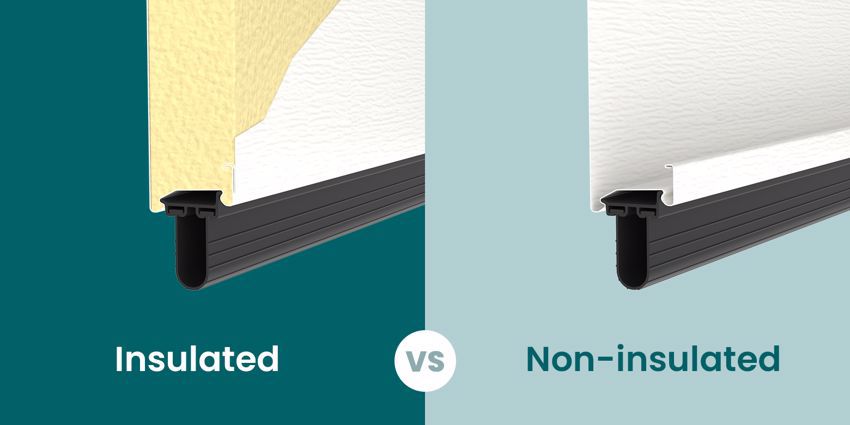The Benefits of an Insulated Garage Door (and Why You Should Install One)
- Nov 26, 2024
- Seasonal Tips
- 8 minute read

There are many benefits of an insulated garage door that your garage and home can enjoy. From enjoying a cooler garage in summer and a warmer garage in winter to saving money on energy costs, there are many good reasons to insulate your garage door.
Are these benefits worth it, though? Are the energy savings significant? Will you really spend more time in a garage with better temperature regulation? Let’s explore these questions by sharing the benefits of an insulated garage door, then you can decide if it’s simply a nice luxury or a realistic and worthwhile upgrade to your home.
What Is an Insulated Garage Door?
There’s a lot to consider when it comes to garage door construction, and insulation is a key factor. Insulated garage doors consist of a standard garage door along with a layer of insulation. The three most popular types of insulation are:
- Fiberglass insulation: Fiberglass is a type of batt insulation. Batt insulation is a flexible form of insulation that’s relatively easy to install, though it’s not as precise as foam insulation. Fiberglass is the most affordable form of batt insulation. It’s available in one-and-a-half-inch-thick strips or rolls.
- Polystyrene insulation: Expanded polystyrene (EPS) and extruded polystyrene (XPS) are two types of foam insulation. EPS is lightweight, rigid and composed of polystyrene beads. XPS is also a rigid foam insulation, but manufacturers make it using blowing agents, heat and an extruding machine. XPS is available in blue, green and pink foam boards and with the option of a paper backing for increased sturdiness.
- Polyurethane insulation: There are two types of polyurethane insulation for garage doors: polyurethane (PUR) and polyisocyanurate (PIR). Both offer high levels of thermal efficiency and strength. Polyurethane insulation is a spray-on material that foams up to create an insulated barrier. Both PUR and PIR are resistant to fire, mold and water damage. PUR is also useful for filling small gaps within garage doors.

An insulated garage door is key to keeping the hot air out and the cool air in.
What’s the Difference Between Insulated and Non-Insulated Garage Doors?
Insulation is a major factor in garage door construction. An uninsulated door doesn’t have an extra layer of insulation behind the door. Sometimes homeowners can add insulation to non-insulated doors themselves, but this doesn’t always work well and, in many cases, it’s better to purchase a manufacturer-made insulated garage door. With foam insulations, though, it is easier to spot-fix drafty areas or spaces or the insulation is crumbling. PUR is often the easiest type of insulation to use for this purpose.
Non-insulated garage doors have some advantages. For example, they’re lighter and often more affordable. You also don’t have to worry about applying insulation over the years. However, there are drawbacks to an uninsulated garage door, and some of these disadvantages can be quite significant.
What Are the Benefits of an Insulated Garage Door?
There are many benefits to outfitting your garage door with proper insulation. Some benefits are more relevant based on your location, but insulated doors provide numerous advantages regardless of where you live. These include:
- Keeping out the cold: The primary benefit of garage door insulation is thermal resistance. The insulation adds a more formidable barrier to the outside temperature than the door alone does. In the cooler months, the cold air outside won’t infiltrate your garage nearly as much if your door is insulated. This makes your garage space much more liveable throughout autumn, winter and spring, whether you want to practice your musical instrument in privacy or need a spot for your workbench for repairs, crafts and DIY projects.

An insulated garage door adds more space to your home to play in comfort.
- Keeping out the heat: The cold months aren’t the only periods where you might want to keep the external temperature out of your garage. You may not have cold winters where you live, but nearly all of the country experiences hot summers. Garage door insulation will help keep your garage a little cooler and more enjoyable to spend time in when it’s hot out. Temperature regulation works best if you have a fully insulated garage, not just your door.
- Improved durability: This is an advantage many people don’t always consider. Constructing a garage door with insulation actually makes it more durable, helping it stand up to the elements and minor collisions. Garage door insulation can mean you won’t need a garage door replacement as soon as you otherwise might.
- Sound dampening: If you have a non-insulated garage door and a driveway of standard length, it won’t be difficult for people on the street to hear what you’re doing in your garage — and vice versa. As a sound dampener, garage door insulation provides you and your family with more privacy.
- An additional home selling point: Even if you don’t spend any of your free time in your garage, the person who buys your home may want to. Having garage door insulation is something positive you can mention if you sell your home. While garage door insulation is unlikely to be a deal breaker for any prospective buyer, knowing that the garage door is insulated means there’s one more benefit and one fewer thing for them to do in the future in terms of renovation.
- Improved energy efficiency: Insulating your garage can actually save you money. If your garage is attached to your home, then the increase in energy efficiency could prove significant. Without an insulated garage, heat from your home can escape fairly easily through your garage. Similarly, some of the energy you use for air conditioning in summer will go out the door without insulation. Improved energy efficiency can be a real boost to your wallet over time.
What Are R-Values and U-factors?
R-values and U-values are both key when evaluating garage doors. R-value measures thermal resistance, while U-value measures thermal transmittance. You want a lower U-factor, as that indicates less heat transfer. This means better insulation and more energy savings.
R-values are handy for comparing different types of insulation. For example, fiberglass insulation has a thermal resistance value between R-2.35 and R-3.22 per inch of thickness. EPS and XPS have R-values of R-4.6 and R-5 per inch of thickness, respectively. Polyurethane has a wide range, from R-5.6 to R-8.0 per inch. This means, judging by thermal resistance alone, polyurethane is the best-performing insulation.
The best insulation has a low U-factor because that indicates a lower rate of thermal transmittance. For example, PIR insulation often has a thermal conductivity of 0.022 W/mK, meaning 0.022 watts per square meter kelvin. XPS insulation usually achieves a thermal conductivity of around 0.033 W/mK.
Because the PIR number is lower, that means it’s a better product for keeping the temperature from outside your garage from transferring inside. It’s important to note, though, that each individual product will have its own R-value and U-factor and these two metrics aren’t the only factors to consider when choosing garage door insulation.
How Do Insulated Garage Doors Work?
The insulation on a garage door works similarly to home insulation. It adds a buffer between the outside world and your home. Sometimes people have insulation in their garage walls and/or garage ceiling, but not the door. This allows all the warm or cold air they’ve otherwise saved to simply flow through the door. An insulated garage door solves this issue.
With garage door insulation, it’s vital to ensure proper clearance for the added depth of the door. Because you open and close your garage door regularly, the insulation must not be too thick or heavy such that it interferes with the basic function of the door. This is especially true for an overhead door, because insulation that’s too thick may contact the garage door opener or the belt/chain.

Insulating your home keeps it nice and cozy, so why not insulate your garage door, too?
Are You Ready to Enjoy the Benefits of an Insulated Garage Door Upgrade?
Ultimately, an insulated garage door is a significant upgrade on a non-insulated door. Not only is the extra cost of an insulated door reasonable, but effective garage door insulation can actually save you money over time. With improved energy efficiency, a longer average lifespan and the potential for a higher sale price when you eventually sell your home, installing an insulated garage door could be a wise financial decision.
Are you ready to reap the benefits of an insulated garage door? Use our garage door design feature to see what your dream garage door could look like!

